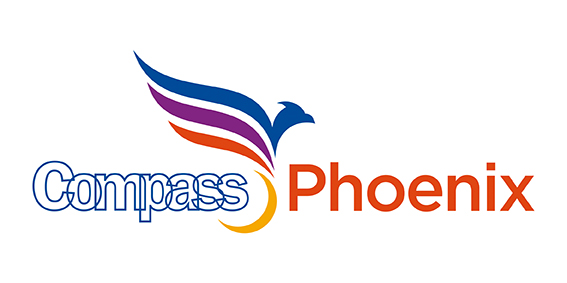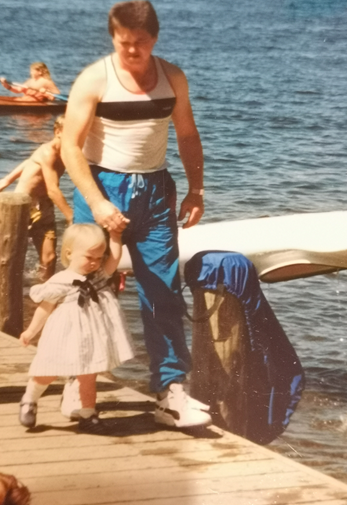
Published on: November 24, 2021
by Pip Nix, Compass Phoenix Training & Consultation Worker
As Child Grief Week begins, this brings about for me a time of great reflection. This is something that is very close to my heart, it is an experience that I feel so familiar with.
As a child, I was faced with many bereavements. Firstly, I lost both my dad and my grandad together in an accident. By the age of 17, I had lost all but one of my grandparents, a parent, as well as the loss of a close friend’s sibling too. Not to mention some very beloved family pets!
These experiences shaped the rest of my life. You might expect me to say that in every way it tarnished my life with hurt, pain and trauma. While this may be true to some degree, I also feel it has made me who I am today and some of these have been incredibly positive. When others that I love have faced loss, I have been there with a lantern of light and hope, ready to walk that dark and often lonely path with them. I believe it has made me more empathetic and caring.
I remember that even as my 10-year-old self, having had my world turned upside down by the death of my dad (and grandad) I knew that I was now different to my peers, and I would be for the rest of my life. I had experienced things they never would (nor would I want them to) and I saw the world so differently now. It felt like I had some kind of mark on me, one that would never wash off or go away. As someone who is content in being different and not going with the ‘norm’ I found myself desperately wanting to be normal. Yet at the same time, how could life ever be normal again with my dad not being there, and the trauma it left behind?
I liken grief to being like a boulder; a boulder that you always have to carry, and you can never put down. The boulder is heavy, and at first it takes time to find the best way to carry the boulder so that it isn’t weighing us down so much we can’t move. Others may come along, and show us how they carry theirs, eventually we find our rhythm and we keep moving forward. Then we have days where the boulder slips, maybe we hear a song, or it is their birthday, and we feel the full weight all over again. But just as before, we find our balance and again maybe it is those around us who remind us of the best way to balance that weight.
Grief is not a timed process, it does not stop in 6 weeks, 6 months or 6 years down the line, it truly is a lifelong process. I know this is something my peers always found difficult to understand, it felt like as more time passed, I should surely be ‘over it.’ Even now as I am in my 30’s my journey with this grief continues. As I grew older, matured and experienced different things, it could feel like my grief would start all over again and my mind had to readjust to these new parameters. For instance, as I got older my understanding of how they died increased and needed to be processed. Then there were other events that brought back to the forefront of the permanency of their death, such as buying my first car (having my first break down in it!) graduating, getting married and most recently – becoming a mum. All these things remind me of the moments that have been lost and this can be painful, but I find ways to make my dad a part of these experiences. For instance, at my wedding, my ‘something borrowed’ was one of his handkerchiefs. My mum mentioned him in her wedding speech, and my photographer captured the most beautiful images if his photo with my wedding dress.
One thing that took me many years to understand, is that I can still have a relationship with my dad. Now I know this sounds strange, and I am not talking about performing a séance! There are still times where even all these years later I meet someone who knew my dad, and they tell me tales I have never heard. I recall memories with my family, and we share the moments that can make us cry with laughter and even things that used to drive me up the wall! I remember the simple things, like watching Blind Date with him (he loved Cilla!) and Christmas mornings. I tell my son about him, so that he can know him too. I am lucky that I have a space within my family and my friends where I can talk openly about him, and my grief too. That to me is so valuable.
As I mentioned earlier, my experience of bereavement has very much shaped me into who I am and is one of the reasons I work in the field of work I do, and why I qualified as a Youth Worker. Death, like mental health – is a taboo subject. We don’t like to talk about it, and that is understandable. We might be scared we will say the wrong thing or cause upset. And let’s face it, death isn’t exactly a fun topic! Some weeks before my dad passed away, he and my mum spoke in depth about what they would want to happen, should one of them pass away. Unbeknown to them at the time, this conversation meant that we were able to give my dad the send off we knew he would want. This, at a time of great sorrow, provided us with some much-needed comfort and sense of closure in being able to do this. Imagine if we educated our children and young people about death, from how grief might make us feel, to the practical elements of what happens after someone passes away such as planning a funeral and what that might look like – to how to write a will. This could mean that when the time comes that they are faced with these overwhelming prospects, they might feel empowered, and a little less alone. We do this with areas such as healthy relationships and drugs & alcohol, why don’t we do the same with grief and loss? My family and I are passionate about making bereavement and loss an everyday conversation, we are open about our wishes. We don’t view this as being morbid, but a way to give our family as much closure as possible and instead view this as a great gift to leave them with.
If you have any children and young people who have experienced a loss, let them know it is ok to talk. It is ok to share how they are feeling, no matter how that might be. It is ok (and good!) to share those memories – to say their person’s name. Their person has died, but they live on through us. They might have to carry that boulder, but we can guide them to find a way to balance it, and to move forward once more.
For further information on child grief please look here:


